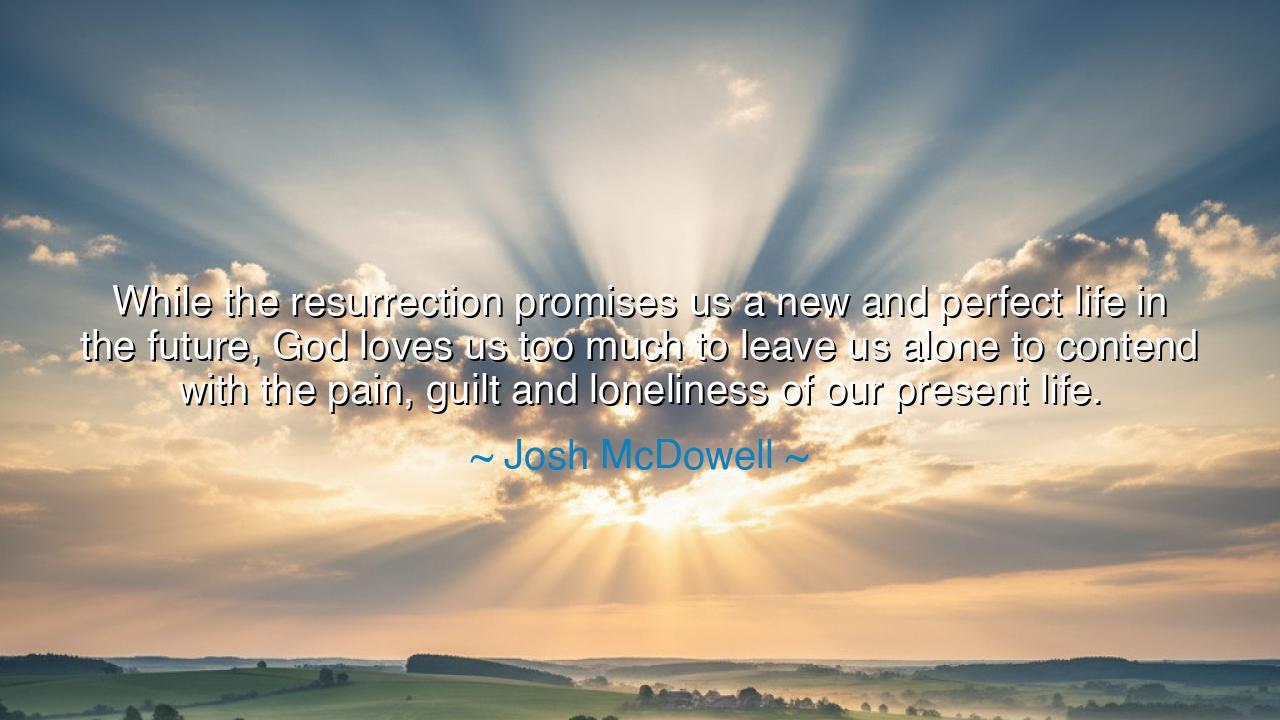
While the resurrection promises us a new and perfect life in the
While the resurrection promises us a new and perfect life in the future, God loves us too much to leave us alone to contend with the pain, guilt and loneliness of our present life.






“While the resurrection promises us a new and perfect life in the future, God loves us too much to leave us alone to contend with the pain, guilt, and loneliness of our present life.” — thus spoke Josh McDowell, a teacher of faith and apologist of truth, whose words are not merely theological but deeply human. In this saying, he reaches into the heart of the believer’s struggle — that ancient tension between the promise of eternal glory and the suffering of mortal days. He reminds us that God’s love is not confined to the afterlife, that divine compassion is not a distant promise but a living presence. The resurrection may shine as a future hope, but grace walks beside us even now, in our pain, our guilt, and our solitude.
The origin of this thought lies in the Christian mystery of the Resurrection — the cornerstone of hope that declares death is not the end, that through Christ all things shall be made new. Yet McDowell saw what many forget: that faith is not merely an anchor for the future, but a balm for the present. The human heart does not only yearn for heaven — it also cries out for comfort here and now, amidst the storms of life. In this truth, McDowell unveils a deeper dimension of divine love: that God is both transcendent and immanent, both the promise beyond the grave and the companion in the valley of tears.
To say that God loves us too much to leave us alone is to proclaim that His mercy is active, not passive; living, not delayed. It is to affirm that the Creator who breathed life into the dust continues to breathe strength into our weakness. Even in the depths of guilt, when the soul trembles beneath the weight of its own failures, love descends — not to condemn, but to restore. Even in loneliness, when the world feels silent, love whispers, “You are not forgotten.” This is the essence of McDowell’s insight: that redemption begins not only in eternity, but in this very moment, wherever the human heart dares to open itself to grace.
Consider the story of Corrie ten Boom, the woman who endured the terror of the Nazi camps and yet emerged with faith unbroken. After the war, she met face to face one of the guards who had tormented her sister. The weight of her pain was unbearable — until she prayed for the strength to forgive. “I cannot forgive him, Lord,” she whispered, “but You can through me.” And in that instant, as she reached out her hand, she felt divine love flow through her — a presence greater than her own will, healing what hate had wounded. Her story is living proof of McDowell’s words: that God does not wait for heaven to renew us, but meets us here, transforming agony into grace.
McDowell’s insight also speaks to the modern heart, which so often confuses hope with escape. Many long for an end to suffering, yet forget that the journey through suffering is the forge of faith. God’s love does not always remove the pain, but it redeems it; it turns wounds into wisdom, and tears into seeds of compassion. The promise of the resurrection does not mean that life now is meaningless — it means that every trial is infused with divine purpose, that no sorrow is wasted in the hands of God.
In the language of the ancients, one might say: the same sun that will one day rise in fullness already casts its dawn upon us. The resurrection, though future in its fullness, already begins to stir in the heart that dares to believe. The Spirit that raised Christ from the tomb moves even now among the brokenhearted, the weary, and the lost. This is the mystery McDowell reveals — that divine love is both promise and presence, both the light of tomorrow and the lamp of today.
The lesson, then, is this: do not wait for eternity to feel the touch of heaven. Look for it in your present suffering — for there, too, God abides. When guilt weighs upon you, remember that forgiveness has already been spoken. When loneliness encircles you, remember that the One who rose from the dead walks still among the living. In every act of kindness, in every breath of courage, in every tear that finds purpose, the resurrection lives.
So let the words of Josh McDowell ring in your soul: “God loves us too much to leave us alone.” The resurrection may promise a perfect life beyond the veil, but divine love is already at work in this imperfect one. Embrace it. Seek it. Share it. For in the midst of pain, guilt, and loneliness, the heart that turns toward love will find that heaven itself has already begun to rise within.






AAdministratorAdministrator
Welcome, honored guests. Please leave a comment, we will respond soon